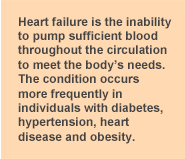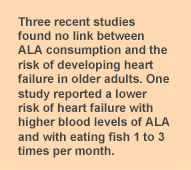
Alpha-linolenic acid (ALA) is the one omega-3 fatty acid found in some plants—flaxseed oil, chia seeds, walnuts, soybean and canola oils, for example. Consumption of foods rich in ALA is associated with a modestly lower risk of overall heart disease, according to a recent statistical analysis of 13 studies, but if one looks at the ALA content in blood or red blood cells instead of diet, ALA is not related to the risk of heart disease. Unavoidable errors in estimating food intakes mean that studies relying on measurements in blood or tissues are considered more reliable. Research on the consumption of long-chain omega-3s from seafood or supplements has frequently reported significantly lower risks of heart disease, in contrast to the findings on ALA. However, not all types of heart disease respond to differences in dietary fats in the same way. Recently, three groups of investigators reported on the relationship between dietary intakes or blood levels of ALA and the risk of developing heart failure. In this type of heart disease, the heart is unable to pump sufficient blood throughout the circulation to meet the needs of the body. As a result, individuals with heart failure experience shortness of breath, fatigue and swollen ankles, feet or abdomen. Half the people with heart failure die within the first 5 years of diagnosis. Can people protect themselves from this disease? Because heart

failure is more likely to develop in individuals with diabetes, hypertension, heart disease and obesity, controlling these conditions with medical therapies and changes in lifestyle substantially lowers the risk of heart failure. Consuming fish on a regular basis may also reduce the risk of heart failure according to several studies, especially among women, but not all studies agree. Does the consumption of foods rich in ALA protect against the risk of heart failure? In the first of 3 studies described here, researchers examined the data from the Swedish Mammography Cohort, a large study that is monitoring women for modifiable factors related to the occurrence of several chronic diseases. Food intake information from this study permitted the researchers to look at the relationship between ALA consumption and hospitalization for or death from heart failure. Over the 9-year study period, they found no link between the consumption of ALA and the risk of heart failure. The second study looked at dietary and blood fatty acid data from the Cardiovascular Health Study of older adults who were monitored for at least 10 years. The investigators found that neither dietary intakes nor blood ALA levels were related to the risk of developing heart failure.

The third study analyzed data from the Physicians’ Health Study in the U.S. This trial was designed to evaluate whether low-dose aspirin and
β-carotene could reduce the risk of developing cancer or cardiovascular disease. The analysis looked at blood levels of ALA and long-chain omega-3 fatty acids and the occurrence of heart failure in men between the ages of 40 and 84 years. The investigators also examined the dietary data available from the study. Perhaps surprisingly, the study showed no connection between blood levels of long-chain omega-3 fatty acids and the risk of heart failure. In contrast, higher blood levels of ALA were associated with a significantly lower risk of heart failure. When the investigators examined the dietary intakes of ALA, long-chain omega-3s and fish, they found no relationship between the amount of ALA or long-chain omega-3s consumed and the risk of heart failure. However, those who ate fish at least 1 to 3 times per month had a significantly lower risk of heart failure. Eating fish more frequently was not linked to any further reduction in risk. All 3 studies concluded that dietary ALA was not associated with a lower risk of heart failure. One study reported a lower risk of heart failure with higher blood levels of ALA, but not with the level of long-chain omega-3s in blood. Thus, the findings from the Physicians’ Health Study stand in contrast to the other studies. In common with other investigations, however, fish consumption was associated with a lower risk of heart failure. These recent studies generally confirm that ALA contributes little to lowering the risk of heart failure.
 Alpha-linolenic acid (ALA) is the one omega-3 fatty acid found in some plants—flaxseed oil, chia seeds, walnuts, soybean and canola oils, for example. Consumption of foods rich in ALA is associated with a modestly lower risk of overall heart disease, according to a recent statistical analysis of 13 studies, but if one looks at the ALA content in blood or red blood cells instead of diet, ALA is not related to the risk of heart disease. Unavoidable errors in estimating food intakes mean that studies relying on measurements in blood or tissues are considered more reliable. Research on the consumption of long-chain omega-3s from seafood or supplements has frequently reported significantly lower risks of heart disease, in contrast to the findings on ALA. However, not all types of heart disease respond to differences in dietary fats in the same way. Recently, three groups of investigators reported on the relationship between dietary intakes or blood levels of ALA and the risk of developing heart failure. In this type of heart disease, the heart is unable to pump sufficient blood throughout the circulation to meet the needs of the body. As a result, individuals with heart failure experience shortness of breath, fatigue and swollen ankles, feet or abdomen. Half the people with heart failure die within the first 5 years of diagnosis. Can people protect themselves from this disease? Because heart
Alpha-linolenic acid (ALA) is the one omega-3 fatty acid found in some plants—flaxseed oil, chia seeds, walnuts, soybean and canola oils, for example. Consumption of foods rich in ALA is associated with a modestly lower risk of overall heart disease, according to a recent statistical analysis of 13 studies, but if one looks at the ALA content in blood or red blood cells instead of diet, ALA is not related to the risk of heart disease. Unavoidable errors in estimating food intakes mean that studies relying on measurements in blood or tissues are considered more reliable. Research on the consumption of long-chain omega-3s from seafood or supplements has frequently reported significantly lower risks of heart disease, in contrast to the findings on ALA. However, not all types of heart disease respond to differences in dietary fats in the same way. Recently, three groups of investigators reported on the relationship between dietary intakes or blood levels of ALA and the risk of developing heart failure. In this type of heart disease, the heart is unable to pump sufficient blood throughout the circulation to meet the needs of the body. As a result, individuals with heart failure experience shortness of breath, fatigue and swollen ankles, feet or abdomen. Half the people with heart failure die within the first 5 years of diagnosis. Can people protect themselves from this disease? Because heart  failure is more likely to develop in individuals with diabetes, hypertension, heart disease and obesity, controlling these conditions with medical therapies and changes in lifestyle substantially lowers the risk of heart failure. Consuming fish on a regular basis may also reduce the risk of heart failure according to several studies, especially among women, but not all studies agree. Does the consumption of foods rich in ALA protect against the risk of heart failure? In the first of 3 studies described here, researchers examined the data from the Swedish Mammography Cohort, a large study that is monitoring women for modifiable factors related to the occurrence of several chronic diseases. Food intake information from this study permitted the researchers to look at the relationship between ALA consumption and hospitalization for or death from heart failure. Over the 9-year study period, they found no link between the consumption of ALA and the risk of heart failure. The second study looked at dietary and blood fatty acid data from the Cardiovascular Health Study of older adults who were monitored for at least 10 years. The investigators found that neither dietary intakes nor blood ALA levels were related to the risk of developing heart failure.
failure is more likely to develop in individuals with diabetes, hypertension, heart disease and obesity, controlling these conditions with medical therapies and changes in lifestyle substantially lowers the risk of heart failure. Consuming fish on a regular basis may also reduce the risk of heart failure according to several studies, especially among women, but not all studies agree. Does the consumption of foods rich in ALA protect against the risk of heart failure? In the first of 3 studies described here, researchers examined the data from the Swedish Mammography Cohort, a large study that is monitoring women for modifiable factors related to the occurrence of several chronic diseases. Food intake information from this study permitted the researchers to look at the relationship between ALA consumption and hospitalization for or death from heart failure. Over the 9-year study period, they found no link between the consumption of ALA and the risk of heart failure. The second study looked at dietary and blood fatty acid data from the Cardiovascular Health Study of older adults who were monitored for at least 10 years. The investigators found that neither dietary intakes nor blood ALA levels were related to the risk of developing heart failure.  The third study analyzed data from the Physicians’ Health Study in the U.S. This trial was designed to evaluate whether low-dose aspirin and β-carotene could reduce the risk of developing cancer or cardiovascular disease. The analysis looked at blood levels of ALA and long-chain omega-3 fatty acids and the occurrence of heart failure in men between the ages of 40 and 84 years. The investigators also examined the dietary data available from the study. Perhaps surprisingly, the study showed no connection between blood levels of long-chain omega-3 fatty acids and the risk of heart failure. In contrast, higher blood levels of ALA were associated with a significantly lower risk of heart failure. When the investigators examined the dietary intakes of ALA, long-chain omega-3s and fish, they found no relationship between the amount of ALA or long-chain omega-3s consumed and the risk of heart failure. However, those who ate fish at least 1 to 3 times per month had a significantly lower risk of heart failure. Eating fish more frequently was not linked to any further reduction in risk. All 3 studies concluded that dietary ALA was not associated with a lower risk of heart failure. One study reported a lower risk of heart failure with higher blood levels of ALA, but not with the level of long-chain omega-3s in blood. Thus, the findings from the Physicians’ Health Study stand in contrast to the other studies. In common with other investigations, however, fish consumption was associated with a lower risk of heart failure. These recent studies generally confirm that ALA contributes little to lowering the risk of heart failure.
The third study analyzed data from the Physicians’ Health Study in the U.S. This trial was designed to evaluate whether low-dose aspirin and β-carotene could reduce the risk of developing cancer or cardiovascular disease. The analysis looked at blood levels of ALA and long-chain omega-3 fatty acids and the occurrence of heart failure in men between the ages of 40 and 84 years. The investigators also examined the dietary data available from the study. Perhaps surprisingly, the study showed no connection between blood levels of long-chain omega-3 fatty acids and the risk of heart failure. In contrast, higher blood levels of ALA were associated with a significantly lower risk of heart failure. When the investigators examined the dietary intakes of ALA, long-chain omega-3s and fish, they found no relationship between the amount of ALA or long-chain omega-3s consumed and the risk of heart failure. However, those who ate fish at least 1 to 3 times per month had a significantly lower risk of heart failure. Eating fish more frequently was not linked to any further reduction in risk. All 3 studies concluded that dietary ALA was not associated with a lower risk of heart failure. One study reported a lower risk of heart failure with higher blood levels of ALA, but not with the level of long-chain omega-3s in blood. Thus, the findings from the Physicians’ Health Study stand in contrast to the other studies. In common with other investigations, however, fish consumption was associated with a lower risk of heart failure. These recent studies generally confirm that ALA contributes little to lowering the risk of heart failure.

